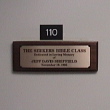|
|
|
|
- It has been said that the book of Job is "everything you can say to God's
face and still live." (John Fortner)
- Job is a long, dramatic dialogue in poetic form. It is capped with a
prologue and epilogue that is written in prose.
- The majesty of the language used in Job is recognized by many people.
Martin Luther said that Job was "more magnificent and sublime than any
other book of Scripture." Alfred Lord Tennyson (poet laureate of England)
called Job "the greatest poem whether of ancient or modern literature."
Victor Hugo called Job the "greatest masterpiece of the human mind." The
book of Job has been counted among great literary work with The Oddesy
and The Illiad, e.g.
- Job is very elegantly written. Much of it's elegance will be lost on us
as we concern ourselves with studying the translation since none of us
are great scholars of Hebrew poetry. For example, in Job, there are 110
words that are not found elsewhere in the any other Old Testament books.
Examples of the variety of language in Job include that there are 5
different words for lions, 6 for traps, and 6 for darkness. Job is full
of similes and metaphors. Job also contains a lot of poetic parallelism
(two lines with the second line completing or contrasting the first, which
is typical of Hebrew poetry.)
- Job has had a great impact on our everyday speech, even today. E.g., "My
hair stood on end." (4:15b), "Take my life in my hands." (13:14b), "I have
escaped by the skin of my teeth." (19:20b), "The root of the matter."
(19:28b), "Spit in my face." (30:10b), "Words without knowledge." (35:16b),
and many more.
- The book of Job is anonymous.
- Jewish tradition credits Moses as the author.
- Other potential authors are Elihu, Solomon, Hezekiah, Ezra, a nameless Jew
living somewhere between 500 and 200 B.C., or Job himself.
- Job was written by a single author, which is very evident because of the
interdependence of it's design. Unlike some of the other books we have
recently been studying, Job was not composed of pieces collected by an
editor.
- It is widely believed that Job lived prior to the birth of Abraham, so
the events depicted in Job would take place in the latter part of Genesis
11.
- Why are the events in Job dated so early? Many reasons: he is not
specifically stated to be a Jew, there is no mention of the Exodus or
the Law of Moses, Job is the priest for his own family (i.e., there is no
national priesthood), wealth being measured by livestock fits with the
patriarchal period, Job lived for more than 200 years (characteristic of
lifespans of the era immediately preceding Abraham).
- When was Job written? Perhaps as early as 2100-1900 B.C. (if Job were the
author, e.g.) to as late as the second century B.C. Most likely, Job was
either written in the patriarchal era or the Solomonic era. A Solomonic
writing would obviously be dependent on an accurate oral tradition of the
story being passed down through time.
- Job is a historical figure, not fictional - he is referred to in Ezekiel
14:14, e.g. as a historical figure.
- Several descriptions recorded in Job reveal an advanced knowledge of
science: the evaporation-precipation cycle (36:27-28), wind and weather
directions (37:9, 17), composition of the human body (33:6), suspension
of the earth (26:7), ocean-bottom phenomena (38:16), cloud-lightning
relationship (37:11), the orbits of heavenly bodies and their influence
upon the earth. (38:32-33). There is more recorded in Job about Creation
than is recorded in Genesis (e.g., dinosaurs appear in Job).
- What is the primary lesson of Job? First, let us look at what the primary
lesson is not. Many people believe that the primary lesson in Job is the
answer to the question of why the innocent suffer. This question is never
answered in Job. It cannot be the primary lesson. Instead, the lesson is
the answer to the question of how mortal man shall be justified with God?
This is a lesson that only God can teach!
- Note that James speaks of Job's patience (James 5:11), but this is only a
piece of the puzzle.
- In order to understand Job and the ensuing discourses of his friends,
read Job 1:8 and 2:3, 11-13 and then Job 42:7-9. Pay attention to what
God says about Job and what God says about what Job's three friends
said.
- Job 42:7 says that Job's three friends did not speak what was right
concerning God. When any of these three friends speaks, note how his
reasoning is wrong in respect to God and to Job's suffering. Watch how
Job answers each of his friends. This is particularly difficult because
the arguments that Job's friends offer are sound and persuasive arguments.
It can be easy to assume what Job's friends say is good advice if we are
not careful to keep the big picture in mind during our study.
- Keep in mind as we read Job that we have insights into his situation that
he and his friends did not have. The first several chapters depict a
conversation that takes place between God and Satan which serves to
explain the things that are happening to Job. It is only at the end of
the book that Job learns the entire story. Remember that we have a
different perspective on the events as we encounter them than Job had.
|
